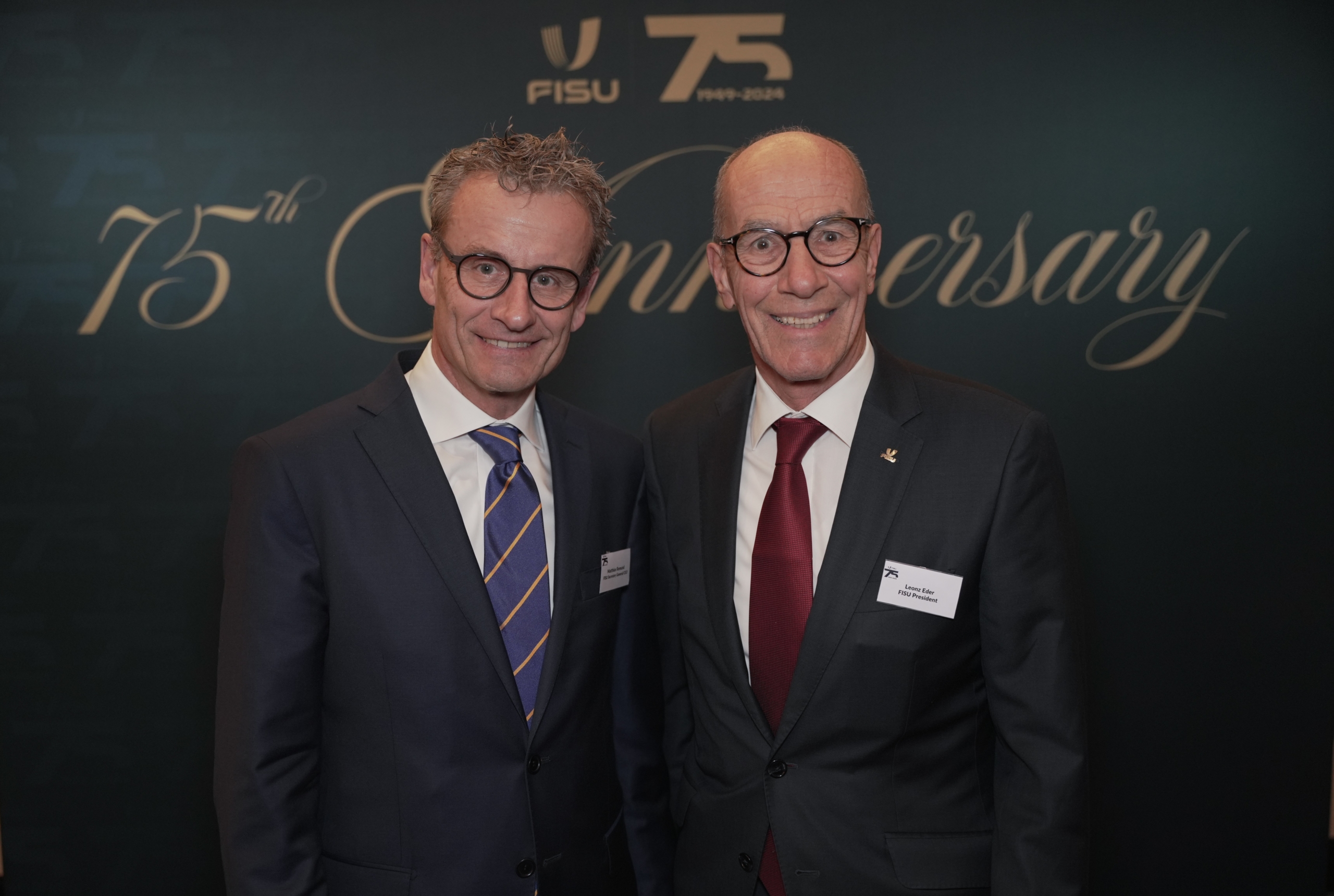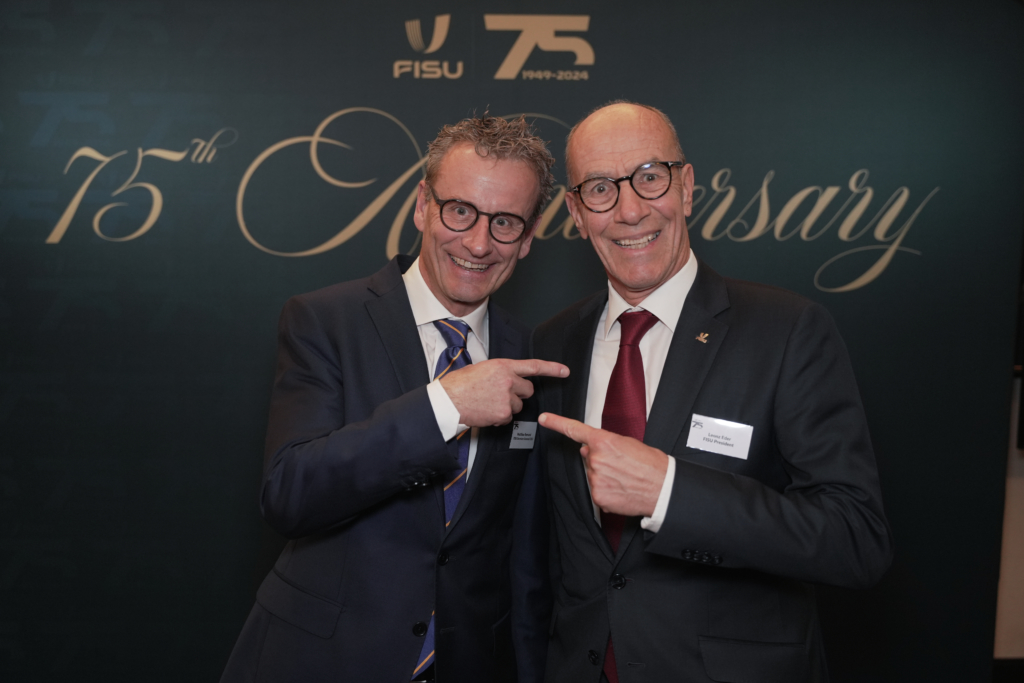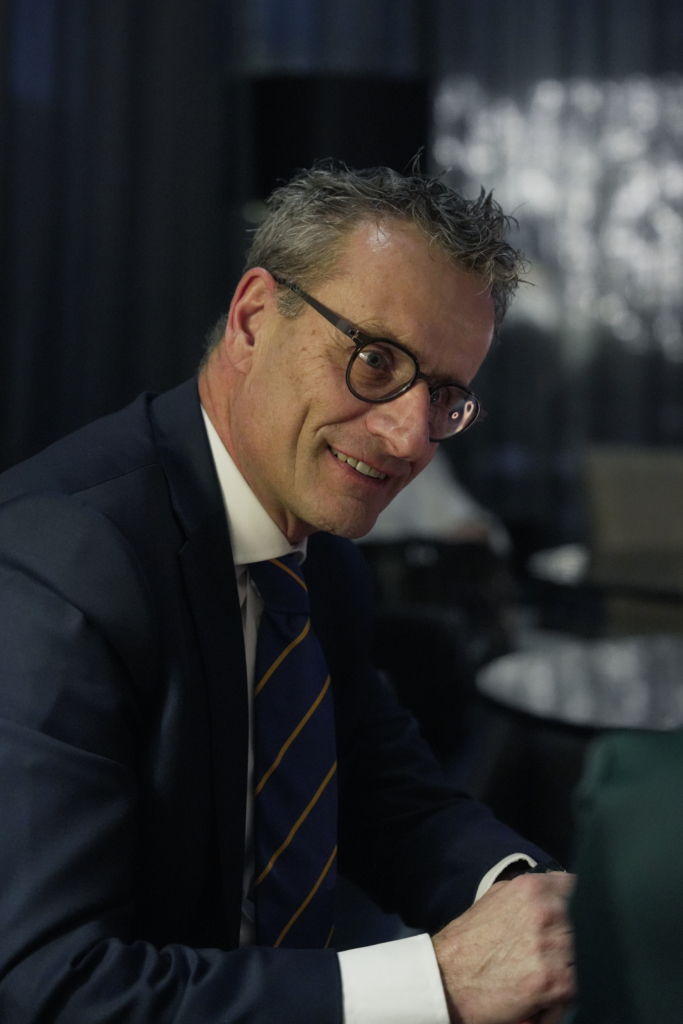“Let’s develop university sports and have fun!” says Matthias Remund – FISU

FISU’s new Secretary General and CEO has now taken over from Eric Saintrond, who will enjoy a well-deserved retirement after serving university sports for almost 40 years. His successor talks about endurance, friends and working as a team.
“I would like to warmly thank Eric Saintrond for his immense legacy to the International University Sports Federation, says FISU President, Leonz Eder. I am grateful to have met someone as imaginative, creative, solutions-oriented, focused, effective and successful as him and wish him all the best for his retirement.”
The transition between both FISU Secretary Generals and CEOs coincided with a small celebration for the 75th Anniversary of the International University Sports Federation held in Lausanne, Switzerland, on 27 November.
“I am really happy to welcome Matthias Remund in the office, smiles President Eder. I have known him for a very long time now, as we have both worked for the promotion of sport in Switzerland. I am confident he is the right person to carry on the excellent work done by his predecessor and I look forward to our fruitful collaboration.”
FISU’s new Secretary General and CEO has now taken his new position at FISU’s headquarters in the Synathlon building on the Lausanne University campus. The perfect occasion to get to know him a little bit better.
-Who are you, Matthias Remund?
-I am 61-years-old, the father of six children and I am fascinated about sports. I have practiced endurance sports, mostly cross-country skiing all my life. But I am also a man who likes to laugh and have fun. Someone ambitious who loves nothing more than a challenge. And I totally agree with the saying “choose a job you love, and you will never have to work a day in your life.”

-Do you remember the first time you heard about FISU?
-Of course I do, even if this goes back quite a while! I was 20 years old, studying law at the University of Bern in Switzerland. I was called to do my compulsory military service and at the same time I was called to take part to the cross-country skiing national university championships. I managed to get into the top ten without much training and that’s when I met Roger Roth, my future coach. Together we decided to take things more seriously and my aim became to qualify for the 1985 Universiade in Belluno, Italy. This was my first experience with FISU and it was a difficult one because I had a rough start with an accident and an injury… But I carried on competing and I must admit this helped me with my studies. My best cross-country season ever was during a semester when I had the most exams. Dual careers are challenging, but they certainly push you upwards.
-What are your memories from the four Universiade (1985, 1987, 1989, 1991) that you experienced?
-We certainly had a lot of fun! For example, in Sofia and Sapporo I met a Russian competitor. He was the only one who spoke English. Today he is a Swiss citizen and he produces cross-country ski poles in the Italian part of Switzerland!
Matthias Remund, the student-athlete
-What are the common qualities to succeed as a cross-country skier and as a lawyer?
-First of all long and hard work. Then, the faculty to analyse! You need to pick the right wax for your skis, study the weather conditions, the temperature, the humidity, the quality of the snow. Then you analyse the course, the terrain and only then you can set up your strategy. And you need to stick to it no matter what. It is the same when you are defending a case. If you need to catch up and debate, then you have lost.
-You are a long distance expert, also in your career…
-Yes and this doesn’t only apply to the number of years I spend at FOSPO (Switzerland’s Federal Office of Sport). I make the most of every hour, every day. In meetings, I never stop: I must admit I love results. Results are why I compete, but I am also a team player and that is why I practice in a group.
-Can you briefly explain what your role at FOSPO?
-I was in charge of the public side of sports, which of course also includes university sport. I was responsible for the Federal Institute of Sport, the two big national sport centres and of course all my activities were linked to sport and education. We distributed subsidies for all national sport facilities, helped the organisers of international events and competitions and also ran the “Youth & Sport Programme”, in which each coach must follow an educational process. This is the foundation of our sports for all movement. In Switzerland, 50% of the young people aged between 5 and 20 years old practice sport regularly.

-According to you, why is university sport so special?
-Because students love sport! Whether it is for competition or just for fun and health. The higher people are educated, the more sport they practice. And this is the case in most countries. There are 40,000 universities in the world, which means 200 million students. FISU has 165 member federations and it is a really exciting challenge to support them in developing sport at every level for all students. We are promoting sport to tomorrow’s leaders.
-What are you most excited about with this new position as FISU Secretary General and CEO?
-I have always dreamed of working at an international level, but with a large family and with my wife’s catering business growing rapidly, I was needed close to them. I have always loved other countries, other languages, other cultures and here I can experience all this with a common challenge. I don’t feel old at all and like with cross-country skiing, I have made a loop and I am back where I started, only the next loop will take me even further! So let’s develop university sports and have fun!
Written by Thérèse Courvoisier, pictures courtesy of Matthias Remund
Related
Sports Medicine Report: Sporting heads east to take on D.C.…
Sports Medicine Report is SportingKC.com’s look at the latest health update around the team ahead of upcoming matches and is pre
😔 João Palhinha’s Bayern Munich nightmare continues
João Palhinha's 2024/25 season has been marred by injury and the Portuguese midfielder had another setback against Bochum.Palhinha was sent off in the 43rd min
Which baseball player could excel at another sport? MLB player…
MLB.com and its beat writers surveyed over 100 players asking them which MLB player would excel at another sport and two Cincinnati Reds players ranked in the T
Raiders had no interest in Aaron Rodgers
When tracking down the details of the Raiders’ latest contract with Maxx Crosby on Thursday, I had a question for our sou











